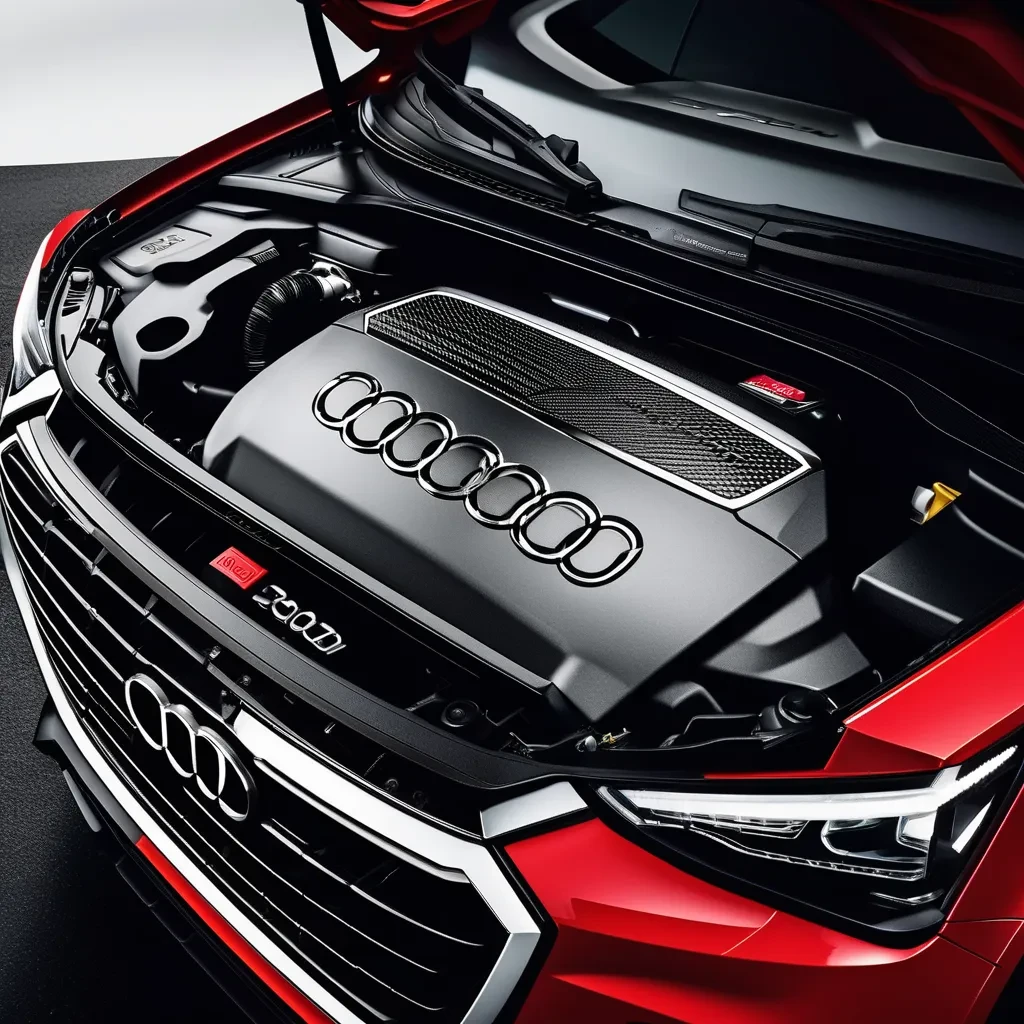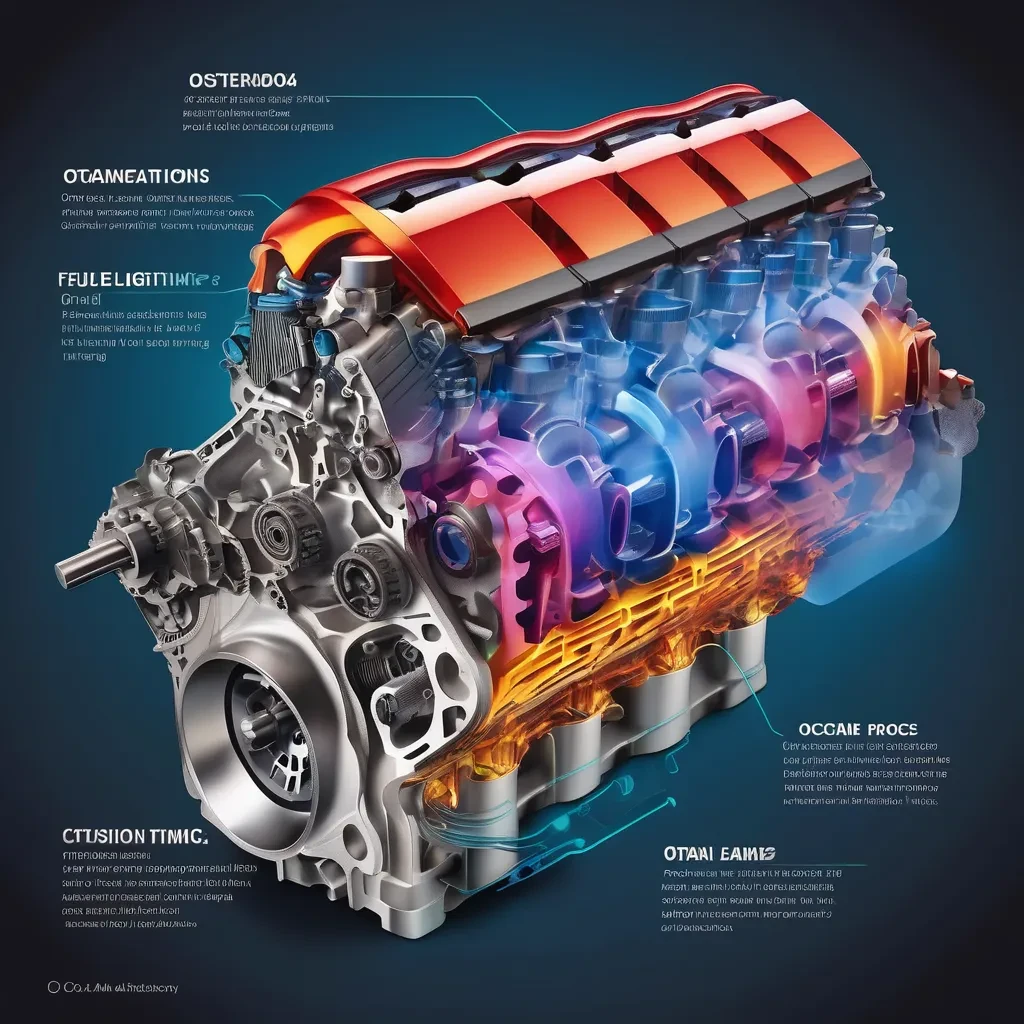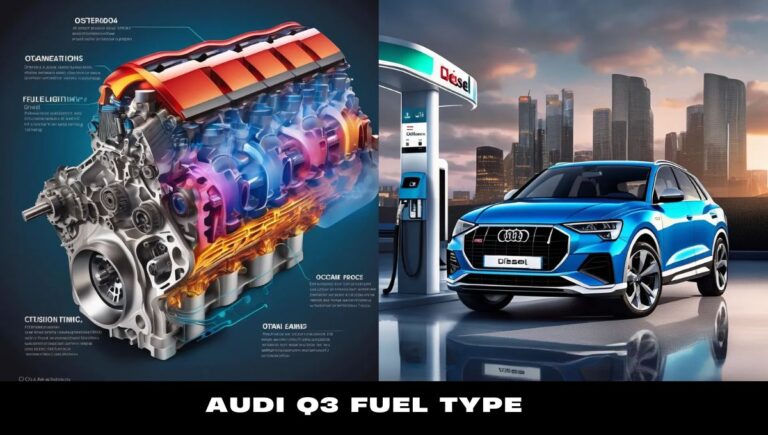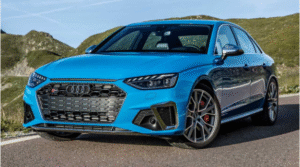Audi Q3 Fuel Type: When selecting a luxury compact SUV like the Audi Q3, one crucial aspect that potential buyers must consider is the fuel type. The fuel type impacts the vehicle’s performance and efficiency, maintenance costs, and overall driving experience.
The Audi Q3 primarily uses petrol or diesel engines, with some models offering hybrid options depending on the market.

This comprehensive guide will explore the different fuel types available for the Audi Q3, their advantages and disadvantages, and how they influence the vehicle’s performance and efficiency.
For more details about Audi, begin your informational exploration with Carsdensity.
Table of Contents:
Cost-Conscious 2024 Audi Q3 Specs
Explore the 2024 Audi Q3, which offers exceptional engine performance rivaling more expensive competitors. Choose between two powertrains: the 40 TFSI with 184 horsepower or the 45 TFSI with 228 horsepower.

Both options come with Audi’s eight-speed Tiptronic transmission, but the 45 TFSI model includes paddle shifters for manual gear changes.
Towing Capacity and Fuel Efficiency
While some sources suggest that the Audi Q3 might tow up to 2,200 pounds when properly equipped, Audi has not officially confirmed this. If towing is a significant factor, consider the Audi Q7, which can handle up to 7,700 pounds.
The Q3 features a 15.9-gallon gas tank and offers competitive fuel economy: 22/29 MPG (City/Highway) for the 40 TFSI and 20/28 MPG for the 45 TFSI. Unlike many luxury vehicles that require premium fuel, the Audi Q3 runs on regular gasoline, providing a cost-effective advantage.
Read Also: Audi Turns Off When Parked – Detail Guide!
2024 Audi Q3 Performance Specs
- Engine Options: 2.0L Turbo 4-Cyl 40 TFSI, 2.0L Turbo 4-Cyl 45 TFSI
- Transmission: 8-speed Tiptronic automatic
- Drivetrain: quattro AWD
- Horsepower: 184 / 228
- Torque: 221 / 251 lb-ft
- EPA-Estimated MPG (City/Hwy): 22/29 MPG for 40 TFSI, 20/28 MPG for 45 TFSI
- Gas Type: Regular
- Gas Tank Size: 15.9 gallons
Audi Q3 Dimensions
The Audi Q3’s compact dimensions make it easy to maneuver and park. It’s ideal for urban driving with an exterior length of 176.6 inches and a width of 72.8 inches (with mirrors folded).
Inside, the Q3 offers 40 inches of front legroom and 36.1 inches in the back. The cargo space is practical, with 23.7 cubic feet available and up to 48 cubic feet when the rear seats are folded down.
Read Also: Drive System Fault Audi – A Comprehensive Visual Guide!
2024 Audi Q3 Dimensions
- Standard Cargo Capacity: 23.7 cu ft
- Maximum Cargo Capacity: 48 cu ft
- Front Legroom: 40 in
- Back Legroom: 36.1 in
- Passenger Seating: 5
- Exterior Length / Width: 176.6 / 72.8 in
Audi Q3 Trims, Features & Technology
Customize your Audi Q3 with the 40 TFSI or 45 TFSI powertrains and choose from Premium or Premium Plus trims. Each trim offers luxurious features such as a panoramic sunroof, alu-optic interiors, power tailgates, leather upholstery, and heated front seats.

Enhance your driving experience with cutting-edge technology, including an 8.8-inch MMI touch screen for navigation and media, a 10.25-inch digital instrument display, and Audi’s voice control system.
Read Also: Audi Bluetooth Function is Currently Unavailable – Discuss with us!
2024 Audi Q3 Trims
- Premium 40 TFSI
- Premium 45 TFSI
- Premium Plus 40 TFSI
- Premium Plus 45 TFSI
What Is Premium Gas?
Premium gas is rated based on its octane level, which measures the fuel’s resistance to pre-ignition due to heat. Contrary to common belief, octane isn’t a component of the fuel. For example, 89-octane gas doesn’t mean it contains 89% octane.
Fuel with lower octane combusts faster, while higher octane fuel resists ignition longer. Audi designs its engines to burn fuel at precise compression levels, making premium fuel ideal for optimal performance.
Most gas stations offer fuel ranging from 87 to 94 octane. Although stations may use regular, premium, and super terms, these are mainly marketing labels. Typically, 87-88 octane is called regular gas, 89-90 is mid-grade, and 91-92 is premium.
Experts agree that premium gas should have a minimum octane rating of 91, while some brands refer to 93-94 octane as super or ultra-premium. Ultimately, the octane rating matters more than the label. If your vehicle’s manual recommends 87 octane, it’s safe to use fuel rated 87 or higher. However, higher octane won’t improve power or fuel efficiency.
Using fuel with a lower octane than recommended can damage the engine. Many Audi models have turbocharged engines with high compression ratios, requiring premium fuel to prevent premature ignition. Early combustion leads to reduced power and efficiency.
Read Also: Audi q7 years to avoid – Don’t take risks!
How Octane Affects Combustion?
Audi engines vary in size from four to ten cylinders depending on the model. During engine operation, the cylinders receive a precise mixture of fuel and air, which is compressed and ignited by a spark plug. This controlled explosion drives the engine’s camshaft, which transfers power to the transmission and axles to move the car.

Each cylinder fires once for every two camshaft rotations, so at 3,000 RPM, a cylinder produces 1,500 explosions per minute. Although an occasional misfire won’t damage the engine, consistent misfiring due to low-octane fuel can harm the cylinders and other components.
Low-octane fuel can cause early combustion, or misfiring, where the fuel ignites due to compression rather than the spark plug. When this occurs, the engine produces a knocking sound. If you hear knocking, switch to the appropriate fuel. If the sound continues, it’s essential to have your Audi inspected to prevent significant engine damage.
Read Also: Drive System Malfunction Audi – Everything you need to know!
Audi Models That Need Premium Gasoline
Audi models with turbocharged engines require premium fuel, while those with naturally aspirated engines can run on regular gasoline. Here are the Audi models that need premium gas:
- Audi Q3: The Q3 has a 2.0-litre turbocharged engine producing 228 horsepower and requires premium fuel.
- Audi Q5: With a 2.0-litre turbocharged four-cylinder engine delivering 201 horsepower, the Q5 needs premium gas. A plug-in hybrid variant increases power to 362 horsepower.
- Audi Q7: This seven-passenger SUV has a 335-hp engine that runs on premium fuel.
- Audi Q8: The Q8’s 3.0-liter six-cylinder turbo engine, producing 335 horsepower, also requires premium gas.
- Audi A3: The A3 sedan has a turbocharged inline four-cylinder engine with 201 horsepower that demands premium fuel.
- Audi A4: With a 261-hp turbocharged inline four-cylinder engine, the A4 requires premium gas.
- Audi A5: The A5 offers several powertrains, from a turbocharged inline four-cylinder with 261 horsepower to a 3.0-litre V6 twin-turbo engine delivering 444 horsepower, all of which need premium fuel for optimal performance.
Read Also: Do Audi Dealers Negotiate? – A Complete Visual Guide!
What’s the Difference Between Premium and Regular Fuel?
The main difference between premium and regular fuel is their octane rating. Regular gasoline typically has an octane rating of 87, while premium fuel is rated between 91 and 93.
According to TrueCar, fuel economy may vary slightly between the two, but most modern vehicles can safely run on regular gasoline. Unless your car requires explicitly premium fuel, like some older Audi models, regular gas will generally perform just as well.
Additives in Both Fuels
Both premium and regular fuels contain detergent additives that help clean the engine and support its performance. Many auto retailers and dealers offer additional fuel additives you can use, but premium fuel usually contains a higher concentration of these cleaning agents, making extra additives less necessary.
Audi and Top Tier Gasoline
Audi played a role in establishing the Top Tier Gasoline standard, which requires premium fuels to contain more detergent additives than the EPA mandates. These detergents help prevent debris build-up on engine parts like intake valves and fuel injectors, improving performance and reducing emissions over time.
Read Also: Audi vin decoder options list – Comprehensive Visual Guide!
Can You Put 93 Octane Fuel in an Audi?
Yes, using 93-octane fuel in your Audi will allow it to perform just as well as when using premium fuel. However, 93-octane is often more expensive than regular premium fuel, so it’s only necessary if you drive a high-performance Audi model.
Standard premium fuel is sufficient for most models, and there’s no need to spend extra on 93-octane when stopping for gas.
Read Also: Audi q8 throttle lag fix – Don’t take a risk!
Which Type of Fuel Should You Use in Your Q3?
95 RON fuel is recommended for most standard vehicles, while high-performance cars generally require 98 RON. To ensure you’re using the correct fuel in your Audi Q3, it’s essential to check your owner’s manual.

Always follow the fuel guidelines to avoid engine issues, enhance performance, and reduce fuel consumption.
Frequently Asked Questions:
Is 95 RON fuel suitable for the Audi Q3?
Yes, 95 RON fuel is generally suitable for the Audi Q3. However, using a higher-octane fuel like 98, RON can further optimize the performance of turbocharged engines. Following the fuel recommendations outlined in your owner’s manual is best.
Can I use 93-octane fuel in my Audi Q3?
Yes, 93-octane fuel is excellent for the Audi Q3 and will help the engine perform at its best. Although more expensive than regular premium fuel, 93-octane ensures optimal combustion and performance, especially for turbocharged engines.
What fuel is recommended for the 2.0 TFSI Audi Q3 engine?
The 2.0 TFSI engine in the Audi Q3 typically requires premium gasoline with an octane rating of 91 or higher. Using premium fuel helps maintain the engine’s performance and efficiency
Is 98 RON fuel necessary for the Audi Q3?
While 98 RON fuel is unnecessary for the Audi Q3, it can enhance performance. The Q3 can run efficiently on 95 RON or 91-octane fuel, but 98 RON may provide a performance boost for high-compression engines.
Can I use ethanol-blended fuel in my Audi Q3?
Audi Q3 vehicles are generally compatible with ethanol-blended fuels, such as E10 (10% ethanol). However, it is essential to check the owner’s manual for specific recommendations, as some engines may not be suited for fuels with higher ethanol content, like E85.
Will using premium fuel prevent engine knocking in my Audi Q3?
Using premium fuel with a 91-octane rating or higher can help prevent engine knocking in your Audi Q3. Higher-octane fuel resists premature combustion, ensuring the engine runs smoothly without crashing.
Conclusion:
At the end of the conclusion,
The Audi Q3 mainly comes with petrol or diesel engines; some models also offer hybrid versions in specific markets.











